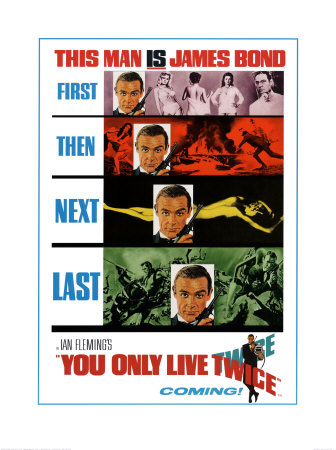
YOU ONLY LIVE TWICE
UK, 1967, 115 minutes, Colour.
Sean Connery, Donald Pleasence, Charles Gray, Bernard Lee, Lois Maxwell, Desmond Llewellyn.
Directed by Lewis Gilbert.
You Only Live Twice is one of Ian Fleming’s most serious novels. It is one of his later works, focusing (as in several other of his novels) on an aspect of the Seven Deadly Sins. This one is sloth – accidie, the vice of indolence associated with a weariness of life and suicide, prevalent in Japan. Blofeld is an embodiment of this sloth. However, this is mainly eliminated from the film which concentrates on action and the basic plot of the novel.
The film anticipates 2001: A Space Odyssey by a year but shows the effect of space exploration of the 1960s. It is also a film of the Cold War, the clash between the US and the Soviet Union with attempts at the UK to mediate.
The first four James Bond films followed the novels more closely. This film indicates a widening of popular appeal, locations especially in Japan, with more spectacular action. This was the last of Sean Connery’s James Bonds in the initial series. George Lazenby appeared in the next, On Her Majesty’s Secret Service with Connery doing Diamonds are Forever in 1971.
The film was also interesting in its presentation of martial arts on screen, quite extensive before the popularity of Bruce Lee and martial arts films in the early 1970s. The film also uses a Ninja attack for its climax.
As with the other James Bond films, the climax is with Bond infiltrating the secret lair of the arch-villain, a down to the final second stopping the destruction of the world.
The theme, by John Barry, sung by Nancy Sinatra, is one of the most popular of the James Bond songs.
1.James Bond in the 1960s, action, espionage, representing the United Kingdom, his personal reputation?
2.Sean Connery as James Bond, Scots accent, style, tough, his drinks shaken not stirred, his relationship with women, the quips?
3.M and his role, the control, Miss Moneypenny and the flirting, Q and the various gadgets? Audiences expecting this?
4.The musical score, the theme song, the credits and the tone? The James Bond musical theme?
5.Space, the exploration in the 1960s, rockets? The Soviet Union and America and the rivalry? The role of the United Kingdom? A film before the moon landing? Issues of power, wealth? The siting of the film in Japan? The film’s credibility concerning rockets, war, ransoms? Blofeld as the arch-villain?
6.The title, James Bond and his dying in Hong Kong, the shooting, the newspaper reports, the burial at sea, his being saved, going to the submarine, M and his mission? Blofeld quoting the title for Bond?
7.The mission, the time element, Blofeld and his control, going to Japan, the girls, the office of Osatu? The European femme fatale? Osatu and his orders to kill, the sexual relationship with Bond? Plotting with her? Her flying the plane?
8.Tiger, his role in Japan, his assistant, Tiger’s aplomb, his work, supporting Bond? His various assistants and their help? With the cars, the escape?
9.The plan with Bond as Japanese fishermen, his wife, in the village, the work, the diving?
10.The volcano, Q and his small helicopter, the surveillance, the chase, Bond firing the variety of weapons at the planes? His “wife” and her getting back to Tiger, the message about the volcano?
11.Blofeld, stroking the cat, his underlings, the pool with the piranha, the woman and her death, his shooting Osatu, his henchman and Bond pushing him into the piranha pool? Blofeld and his eyes, his power hunger?
12.The Ninja, martial arts on screen during the 1960s and 70s, the fights, the techniques, the final attack? The range of training?
13.The rockets, going into space, devouring the American and Soviet rockets? The confrontation between Bond and Blofeld, the countdown, the staff, the technicians?
14.The final fights, Tiger and the attack, the Ninjas, the deaths, the battles? The US at the ready to attack the USSR? Bond and the last moment saving the world?
15.The ending, the submarine?
16.Using Ian Fleming’s basic plot – but not developing the deeper meanings about the deadly sins? This screenplay was written by novelist Roald Dahl.